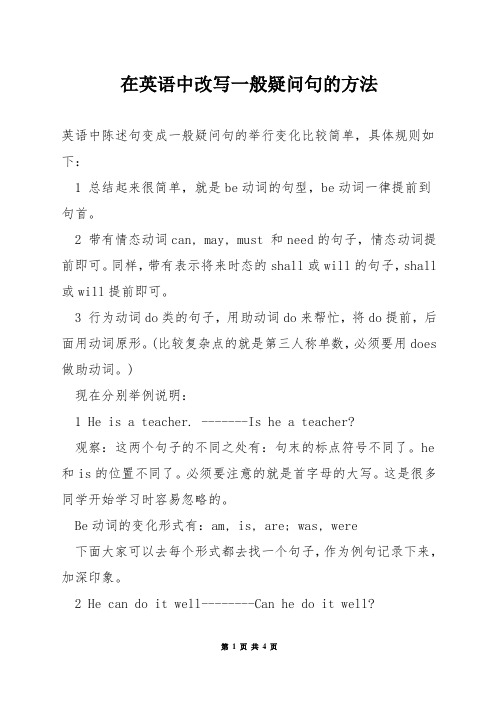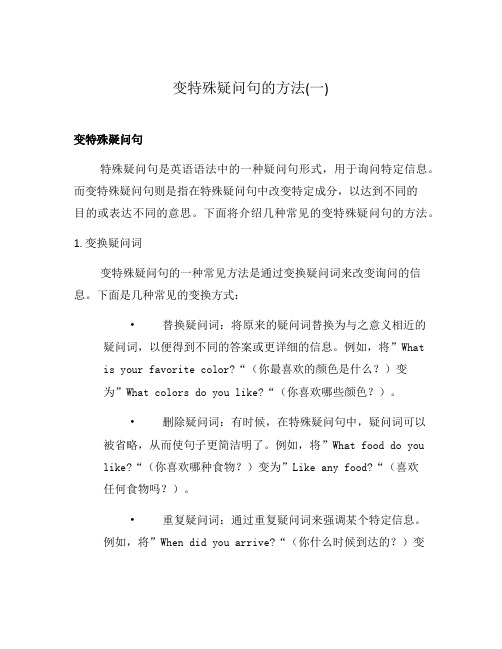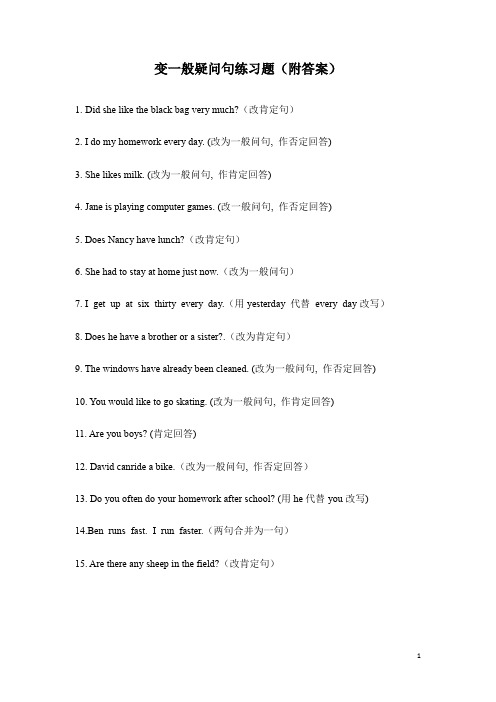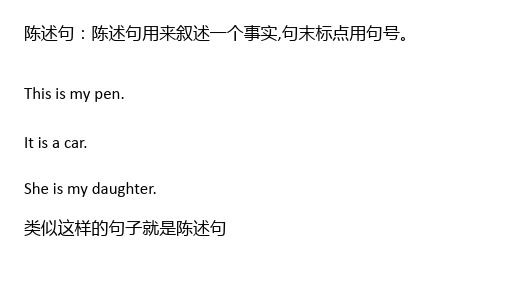疑问句改写
变一般疑问句的方法

变一般疑问句的方法
一般疑问句是用来向对方询问一些陈述的真实性或准确性的句子。
以
下是变一般疑问句的方法:
1.将陈述句的句首动词或助动词移到句首:陈述句"你喜欢吃冰淇淋。
"可以改写成一般疑问句"喜欢你吃冰淇淋吗?"
2.在陈述句末尾加上问号:陈述句"他是个医生。
"改写成一般疑问句
就是"他是个医生吗?"
3.如果陈述句中已经有助动词,只需要将主语和助动词位置互换:陈
述句"他可以来参加聚会。
"改写成一般疑问句就是"可以他来参加聚会吗?"
4.如果陈述句中没有助动词,需要加上适当的助动词来构成疑问句:
陈述句"你懂英语。
"改写成一般疑问句就是"你会不会懂英语?"
5.如果陈述句中有情态动词,将情态动词移到句首:陈述句"他一定
会来。
"改写成一般疑问句就是"一定他会来吗?"
需要注意的是,变一般疑问句时,如果陈述句中有特殊疑问字句(如“what”,“where”,“how”等),则不需要再变换句序。
例如陈述句"What is your name?"不需要改变句序,直接可以用作一般疑问句。
在英语中改写一般疑问句的方法

在英语中改写一般疑问句的方法英语中陈述句变成一般疑问句的举行变化比较简单,具体规则如下:1 总结起来很简单,就是be动词的句型,be动词一律提前到句首。
2 带有情态动词can, may, must 和need的句子,情态动词提前即可。
同样,带有表示将来时态的shall或will的句子,shall 或will提前即可。
3 行为动词do类的句子,用助动词do来帮忙,将do提前,后面用动词原形。
(比较复杂点的就是第三人称单数,必须要用does 做助动词。
)现在分别举例说明:1 He is a teacher. -------Is he a teacher?观察:这两个句子的不同之处有:句末的标点符号不同了。
he 和is的位置不同了。
必须要注意的就是首字母的大写。
这是很多同学开始学习时容易忽略的。
Be动词的变化形式有:am, is, are; was, were 下面大家可以去每个形式都去找一个句子,作为例句记录下来,加深印象。
2 He can do it well--------Can he do it well?观察:这两个句子的不同之处有:句末的标点符号不同了。
he 和can的位置不同了。
当然这些情态动词还会有时态的变化,只要属于情态动词,就可以这样变化。
自己可以找一些例句,印证一下对不对。
3 He does his homework at home every day. -----Does he do his homework at home every day?这里必须要注意的就是疑问句中的do和does,第一个句子中的does是实意动词,第二个句子中的does是助动词,实意动词是do。
大家一定要深入领会这个规律。
I go shopping every Sunday.--------Do you go shooping every Sunday?这里的do就是做go的助动词。
2实义动词怎样变一般疑问句第一:如果是第一、第二人称或者是第三人称复数,变一般疑问句,应在句子前面加Do,举例:You like horses. Do you like horses? 肯定回答:Yes, I do. 否定回答:No,I dont.第二:如果主语是第一人称我、我们时,变一般疑问句也是在前面加Do,但是主语应变成你或你们,举例:I like horses. Do youlike horses? 肯定回答:Yes, I do. 否定回答:No,I dont. 再比如:We like horses. Do you like horses? 肯定回答:Yes, we do. 否定回答:No, we dont.3be动词怎样变一般疑问句第一:如果句子中的be动词是is或are时,变一般疑问句时,把be动词提到句子最前面,主语如果是名字或动物时,要换成相应的代词。
变特殊疑问句的方法(一)

变特殊疑问句的方法(一)变特殊疑问句特殊疑问句是英语语法中的一种疑问句形式,用于询问特定信息。
而变特殊疑问句则是指在特殊疑问句中改变特定成分,以达到不同的目的或表达不同的意思。
下面将介绍几种常见的变特殊疑问句的方法。
1. 变换疑问词变特殊疑问句的一种常见方法是通过变换疑问词来改变询问的信息。
下面是几种常见的变换方式:•替换疑问词:将原来的疑问词替换为与之意义相近的疑问词,以便得到不同的答案或更详细的信息。
例如,将”Whatis your favorite color?“(你最喜欢的颜色是什么?)变为”What colors do you like?“(你喜欢哪些颜色?)。
•删除疑问词:有时候,在特殊疑问句中,疑问词可以被省略,从而使句子更简洁明了。
例如,将”What food do youlike?“(你喜欢哪种食物?)变为”Like any food?“(喜欢任何食物吗?)。
•重复疑问词:通过重复疑问词来强调某个特定信息。
例如,将”When did you arrive?“(你什么时候到达的?)变为”When did you arrive, exactly?“(你确切地什么时候到达的?)。
2. 调整语序变特殊疑问句的另一种方法是通过调整语序来改变句子的意思。
下面是一些常见的调整方式:•将疑问词放在句首:将疑问词放在句首,可以更加强调问题的内容或是对某个特定信息的询问。
例如,将”Youbought the book when?“(你什么时候买的书?)变为”When did you buy the book?“(你什么时候买的书?)。
•使用倒装语序:将动词的主语与其后面的其他成分进行互换,即进行倒装语序,以突出某个特定信息的询问。
例如,将”You have seen that movie, haven’t you?“(你看过那个电影,对吗?)变为”Have you seen that movie?“(你看过那个电影吗?)。
改一般疑问句的方法

改一般疑问句的方法一般疑问句是我们日常交流中经常使用的一种句型,它用来询问对方是否同意或者是否知道某件事情。
在英语中,一般疑问句的构成方式是将助动词放在句子的主语之前,例如,Do you like coffee? Are you coming to the party? 这些都是一般疑问句的典型例子。
那么,如何正确地改写一般疑问句呢?接下来,我们将介绍一些方法来改写一般疑问句。
首先,我们可以使用疑问词来改写一般疑问句。
疑问词包括,what, when, where, why, who, whom, whose, which, how等。
通过使用这些疑问词,我们可以将一般疑问句改写成特殊疑问句,从而更加准确地询问信息。
例如,将"Do you like coffee?"改写成"What do you like?",将"Are you coming to the party?"改写成"When are you coming to the party?"这样一来,我们可以更清晰地表达自己的意思。
其次,我们可以使用倒装句来改写一般疑问句。
倒装句是英语中的一种语法结构,它将句子的主语和谓语动词的位置进行颠倒。
在一般疑问句中,如果主语是名词,则将助动词放在主语之前即可构成倒装句。
例如,将"You like coffee."改写成"Like youcoffee?",将"You are coming to the party."改写成"Are you coming to the party?"这样一来,我们可以通过倒装句的方式改写一般疑问句,使句子更加生动有趣。
最后,我们可以使用情态动词来改写一般疑问句。
情态动词包括can, could, may, might, must, shall, should, will, would 等,它们在句子中用来表示说话人的态度、意愿、推测等。
变一般疑问句练习题(附答案)

变一般疑问句练习题(附答案)1.Did she like the black bag very much?(改肯定句)2. I do my homework every day. (改为一般问句, 作否定回答)3. She likes milk. (改为一般问句, 作肯定回答)4. Jane is playing computer games. (改一般问句, 作否定回答)5. Does Nancy have lunch?(改肯定句)6. She had to stay at home just now.(改为一般问句)7. I get up at six thirty every day.(用yesterday代替every day改写)8. Does he have a brother or a sister?.(改为肯定句)9. The windows have already been cleaned. (改为一般问句, 作否定回答)10. You would like to go skating. (改为一般问句, 作肯定回答)11. Are you boys? (肯定回答)12. David canride a bike.(改为一般问句, 作否定回答)13. Do you often do your homework after school? (用he代替you改写)14.Ben runs fast.I run faster.(两句合并为一句)15. Are there any sheep in the field?(改肯定句)答案:1. She liked the black bag very much?2. Do you do your homework every day? No, I don’t3. Does she like milk? Yes, she does.4.Is Jane playing computer games? No, she isn’t.5. Nancy has lunch.6. Did she have to stay at home just now?7. I got up at six thirty yesterday.8. He has a brother and a sister.9. Have the windows have been cleaned yet? No, they haven’t10. Would they like to go skating? Yes, sure.(等)11. Yes, we are12. Can David ride a bike? No, he can’t.13. Does he often do his homework after school?14. Ben and I run fast.15. There are some sheep in the field.。
一般疑问句的改写和回答

This is my pen. It is a car. She is my daughter. 类似这样的句子就是陈述句
把陈述句改写为否定句。技巧:在be动词am ,is ,are后面加not。 This is my pen.→①This is not my pen. This is my pen.→②This isn't my pen. is not = isn't
对一般疑问句做肯定回答。 口诀:Yes 是老大,找准主语紧跟随,问句中谁开头,答句中谁结尾。
Is this your pen? → Yes, it is.
Is it a car?→Yes, it is.
Is she your daughter?→ Yes, she is.
对一般疑问句做否定回答。 口诀:No是老大,找准主语紧跟随,问句中谁开头,答句中谁结尾 并加上not,可缩写或者不缩写。
把陈述句改写为一般疑问句。技巧:Be动词提句首,其他的按照顺 序抄下来,加上问号。
口诀:一提二抄三问号。 This is my pen.→ Is this your pen?
my→your
It is a car. →Is it a car?
She is my daughter.→Is she your daughter? my→your
It is a car.→ ①It is not a car. It is a car.→ ②It isn't a car. is not = isn't She is my daughter.→① She is not my daughter. She is my daughter.→② She isn't my daughter.
改一般疑问句的方法
改一般疑问句的方法
一般疑问句是一种句式,用来表达某种疑问或示意。
它们常常出现在电影或书中,因为它们可以帮助人们理解发生了什么。
下面就介绍一般疑问句改写的方法。
首先,读者需要明确原句的意思。
一般疑问句一般会涉及到某事是否发生,或者某人是否做某件事。
回答此类问题的方式通常是使用反意疑问句,如:“Did it happen?”成:Did it not happen?
其次,读者可以通过把原句变成一般句来改写一般疑问句。
例如,从“Did you do it?”成:You did it.”
第三,读者可以把一般疑问句变成特殊疑问句来改写。
特殊疑问句除了问句本身外,还涉及到另外一个部分,即答案。
比如,从“Are you going?”成“Where are you going?”
最后,读者可以把一般疑问句变成否定句来改写。
否定句一般会涉及到“not”或“never”等词,如从“Do you like it?”成:You don like it.”
总之,一般疑问句可以改写为反意疑问句、一般句、特殊疑问句和否定句这几种句式。
它们可以让读者更容易理解句子的意思,也能让文章显得更加活泼生动。
当然,读者应该根据文章的需要来选择最合适的句式,以便把精彩的故事讲给读者。
- 1 -。
句型转换疑问句与陈述句的转换
句型转换疑问句与陈述句的转换疑问句和陈述句是英语语法中常见的两种基本句型,它们在表达方式和语调上有所区别。
本文将介绍句型转换的相关知识,包括如何将疑问句转换为陈述句以及如何将陈述句转换为疑问句。
一、将疑问句转换为陈述句在将疑问句转换为陈述句时,需要注意的是将原疑问句的语序改为陈述句的语序,并将原疑问句中的助动词或情态动词去掉。
以下是几个例子:1. Did you eat breakfast this morning? (你今天早上吃早餐了吗?)→ You ate breakfast this morning. (你今天早上吃了早餐。
)2. Does he like soccer? (他喜欢足球吗?)→ He likes soccer. (他喜欢足球。
)3. Can she speak Spanish? (她会说西班牙语吗?)→ She speaks Spanish. (她会说西班牙语。
)4. Are they going to the party tomorrow? (他们明天要去参加派对吗?)→ They are going to the party tomorrow. (他们明天要去参加派对。
)需要注意的是,有些疑问句中的助动词或情态动词是不可以省略的,这时在转换为陈述句时需要保留它们。
二、将陈述句转换为疑问句将陈述句转换为疑问句通常需要在句首加上适当的疑问词或助动词/情态动词,并调整句子语序。
以下是几个例子:1. She is a doctor. (她是一名医生。
)→ Is she a doctor? (她是一名医生吗?)2. I have finished my homework. (我已经完成了我的作业。
)→ Have you finished you r homework? (你完成作业了吗?)3. They went to the beach last weekend. (他们上周末去了海滩。
一般疑问与否定的改写初级篇
Be句型一般疑问句的改写1.It’s a rubber.否定句:一般疑问:2.You’re small.否定句:一般疑问:3.This is Kitty.否定句:一般疑问:4.They are thin.否定句:一般疑问:5.Bananas are yellow.否定句:一般疑问:6.Summer is very hot.否定句:一般疑问:7.The light is red.否定句:一般疑问:8.You’re Miss Fang.否定句:一般疑问:9.It’s a pencil case.否定句:一般疑问:10.Dinner is ready!否定句:一般疑问:11.You’ re nine. I’m five.否定句:一般疑问:12.I am a boy.否定句:一般疑问:13.I’m Danny.否定句:一般疑问:14.I’m coming.否定句:一般疑问:15.I’m tall.否定句:一般疑问:16.I’m a student.否定句:一般疑问:17.We are students.否定句:一般疑问:118.We are friends.否定句:一般疑问:19.We are her sisters.否定句:一般疑问:20.We are ten.否定句:一般疑问:21.They are my family.否定句:一般疑问:22.He’s my father.否定句:一般疑问:23.She is my grandmother. 否定句:一般疑问:24.This is my mouth.否定句:一般疑问:25.This is my kitchen.否定句:一般疑问:26.That’s your face.否定句:一般疑问:27.This is your friend.否定句:一般疑问:28.They are your friends.否定句:一般疑问:29.She’s your Chinese teacher.否定句:一般疑问:30.They are our classmates.否定句:一般疑问:31.These are our books.否定句:一般疑问:32.That’s our English teacher.否定句:一般疑问:33.They are her friends.否定句:一般疑问:34.They are his friends.否定句:一般疑问:35.There are some apples on the table.2否定句:一般疑问:36.There is some milk on the table.否定句:一般疑问:37.There are some cakes and milk on the table. 否定句:一般疑问:38.I’m hungry, thirsty and tired.否定句:一般疑问:39.You’re tall and thin.否定句:一般疑问:40.The table is hard and smooth.否定句:一般疑问:41.They are my mother and father.否定句:一般疑问:42.Autumn is cool and windy.否定句:一般疑问:43.Winter is cold and dry.否定句:一般疑问:44.Summer is hot and sunny.否定句:一般疑问:45.Spring is warm and rainy.否定句:一般疑问:46.The pig is lovely and soft.否定句:一般疑问:47.Moon-cakes are nice and soft.否定句:一般疑问:48.Moon-pie is hard and dry.否定句:一般疑问:49.Pineapples are rough and hard.否定句:一般疑问:50.Apples are hard and smooth .否定句:一般疑问:51.Bananas are soft and smooth.否定句:一般疑问:352.There is a table and a chair in the room. 否定句:一般疑问:53.There are many birds in the tree.否定句:一般疑问:Can句型一般疑问句的改写1.I can sing.否定句:一般疑问:2.I can dance.否定句:一般疑问:3.I can draw.否定句:一般疑问:4.I can see a swing.否定句:一般疑问:5.You can play basketball.否定句:一般疑问:6.You can make apple pie.否定句:一般疑问:7.You can skip rope.否定句:一般疑问:8.She can ride a bicycle.否定句:一般疑问:9.She can play cards.否定句:一般疑问:10.He can play football.否定句:一般疑问:11.He can drive a car.否定句:一般疑问:12.Super girl can fly.否定句:一般疑问:13.Danny can swim.否定句:一般疑问:14.Super dog can run fast.否定句:一般疑问:415.They can see the moon.否定句:一般疑问:16.Super girl and super dog can fly. 否定句:一般疑问:17.Alice can sing and dance well.否定句:一般疑问:18.She can hear many buses.否定句:一般疑问:19.He can see many sheep.否定句:一般疑问:20.They can hear some birds.否定句:一般疑问:21.They can draw flowers and trees. 否定句:一般疑问:22.Ming can hear a car and a bus. 否定句:一般疑问:23.My father can play football.否定句:一般疑问:24.My brother can play basketball very well.否定句:一般疑问:25.Your mother can sing and dance.否定句:一般疑问:26.His sister can draw and write well.否定句:一般疑问:27.Our teacher can sing and dance.否定句:一般疑问:28.We can eat pizza and salad for lunch.否定句:一般疑问:29.Our friends can make sausage and hamburgers.否定句:一般疑问:30.We can have fun on the beach.否定句:一般疑问:31.You can play with your friends.否定句:一般疑问:532.Ginger can jump high and run fast. 否定句:一般疑问:33.I can make a card for my mum.否定句:一般疑问:34.We can make cards for our teachers. 否定句:一般疑问:实意动词一般疑问句的改写1.I want some milk.否定句:一般疑问:2.I like the soup.否定句:一般疑问:3.I want to sleep.否定句:一般疑问:4.I have a good idea.否定句:一般疑问:5.I have a sweater.否定句:一般疑问:6.You like riding bicycle in the park.否定句:一般疑问:7.They like swimming in the water.否定句:一般疑问:8.I like flying kites in the park.否定句:一般疑问:9.You like skating on the ice.否定句:一般疑问:10.They like the milk and bread.否定句:一般疑问:11.They have long tails否定句:一般疑问:12.We have long noses.否定句:一般疑问:13.You have big ears.否定句:一般疑问:614.We like zebras.否定句:一般疑问:15.He has a sweater.否定句:一般疑问:16.She has a dress and a skirt.否定句:一般疑问:17.He likes singing.否定句:一般疑问:18.She likes playing the piano.否定句:一般疑问:19.Alice likes elephants.否定句:一般疑问:20.Danny likes hamburger.否定句:一般疑问:21.Miss Fang has many new skirts.否定句:一般疑问:22.Mr. Wang wants some lemon juice. 否定句:一般疑问:23.My grandmothers sing songs in the park.否定句:一般疑问:24.My grandfather runs in the the park.否定句:一般疑问:25.It has two long ears.否定句:一般疑问:26.It wants some fish.否定句:一般疑问:27.Our teacher helps us with our homework.否定句:一般疑问:28.Our teachers help us with our homework.否定句:一般疑问:29.Alice and Kitty fly kites in the park.否定句:一般疑问:30.Alice and I make cards for our teachers.否定句:一般疑问:731.My sister and brother play games at home.否定句:一般疑问:32.My mother and father love me very much.否定句:一般疑问:33.Alice buys some flowers to her sister.否定句:一般疑问:34.Tom and Danny draw some flowers for the party. 否定句:一般疑问:35.Tom draws some pictures for his class.否定句:一般疑问:36.He hears some ducks on the farm.否定句:一般疑问:37.She sees many lions in the zoo.否定句:一般疑问:38.Ginger tastes the soup and fish.否定句:一般疑问:39.Ginger and Sam want some water.否定句:一般疑问:40.The farmers come.否定句:一般疑问:41.The wolf runs away.否定句:一般疑问:42.The boy likes telling lies.否定句:一般疑问:43.Boys like playing basketball in the playground.否定句:一般疑问:8。
一般疑问句否定句改写
一般疑问句一般疑问句是疑问句的一种。
它是指用yes(是)或no(否)来回答的句子。
其结构是:系动词be/助动词/情态动词+主语+其他成分通常回答为:肯定:Yes,+主语+提问的助动词.否定:No,+主语+提问的助动词+not. 如:Are you from Japan﹖Yes I am./ No I'm not.Is her sister doing her homework now﹖Yes she is./ No she isn't.Does he work in a bank﹖Yes he does./ No he doesn't.Do you live near your school﹖Yes I do./ No I don't.Can you speak French﹖Yes I can./ No I can't.May I go home now﹖Yes you may./ No you mustn't.注意:1.将陈述句变为一般疑问句时,如句中有be 动词(am/ is/ are)时,可直接将它们提至主语前。
如主语为第一人称,应将其改为第二人称。
如:I'm in Class 2Grade 1.→Are you in Class 2Grade 1﹖We're watching TV.→Are you watching TV﹖2.陈述句中有情态动词(can may must …)时,也可直接将它们提至主语前,即可成为一般疑问句。
如:He can swim now.→Can he swim now﹖The children may come with us.→ May the children come with us﹖3.陈述句中只有一个实义动词作谓语且其时态为一般现在时,变为一般疑问句时要在句首加do或does 主语后的实义动词用原形。
- 1、下载文档前请自行甄别文档内容的完整性,平台不提供额外的编辑、内容补充、找答案等附加服务。
- 2、"仅部分预览"的文档,不可在线预览部分如存在完整性等问题,可反馈申请退款(可完整预览的文档不适用该条件!)。
- 3、如文档侵犯您的权益,请联系客服反馈,我们会尽快为您处理(人工客服工作时间:9:00-18:30)。
仿照例句改写下列句子。
例句:She is in Class One, Grade Two.
否定句: She is not in Class One, Grade Two.
一般疑问句: Is she in Class One, Grade Two?
回答:Yes, she is. (No, she isn't)
1. Bob is on the football team.
否定句:
一般疑问句:
回答:
2. They are in the teacher's office.
否定句:
一般疑问句:
回答:
3. It is sunny today.
否定句:
一般疑问句:
回答:
4. There is some water in the bottle.
否定句:
一般疑问句:
回答:
5. There is a piano in the room.
否定句:
一般疑问句:
回答:
6. There are many trees in the school.
否定句:
一般疑问句:
回答:
7. There are four bottles of milk on the table.
否定句:
一般疑问句:
回答:
8. We are interested in painting.
否定句:
一般疑问句:
回答:
